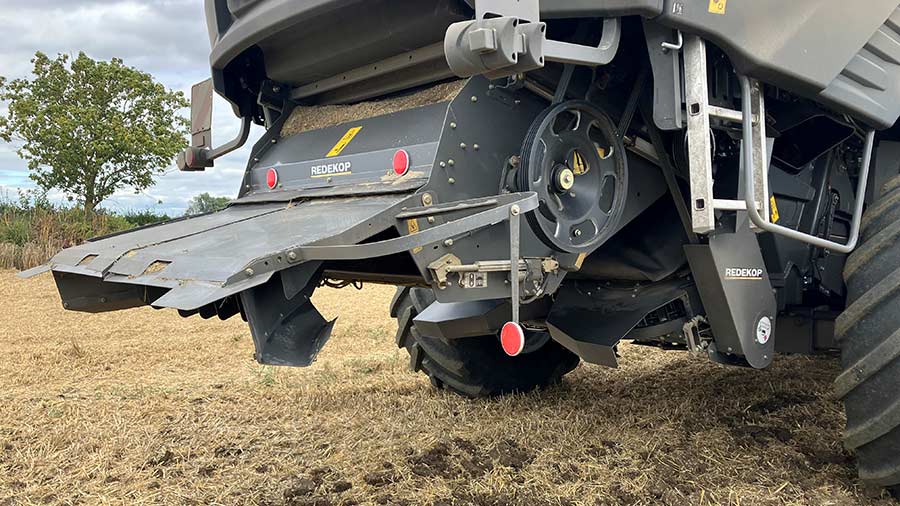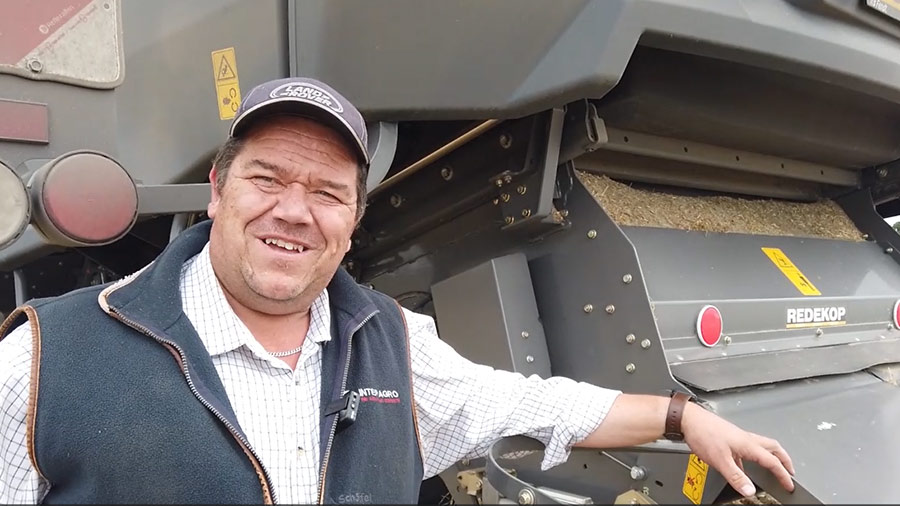Video: Leicester farm trials weed seed unit on Fendt combine
 © Emma Gillbard/MAG
© Emma Gillbard/MAG Europe’s first Redekop seed control unit (SCU) fitted to a Fendt Ideal 10T combine, aimed at controlling weed seeds, is being put to the test this harvest in Leicestershire at the Belvoir Farming Company.
The Canadian-built unit attaches to the rear of the combine and uses a non-chemical approach to destroy up to 97% of harvestable weeds.
In a single pass, the device mills chaff to a fine dust and so destroys any potential weed seeds.
See also: Why blackgrass is so bad in 2023 and what to do about it
The company’s manager, Keith Challen, has been battling blackgrass and other weeds on the farm’s 1,200ha of heavy clay soils for more than a decade and hopes the SCU will add yet another tool to the box to get on top of his weed problems.
“Like many heavy land farmers, we suffer with a lot of blackgrass, bromes, wild oats and now even a little ryegrass.
“We’ve been used to prescriptive solutions out of a can, but as chemistry fails, we are looking at cultural control methods,” he says.
“We have delayed drilling, increased seed rates, and opted for vigorous varieties, but it is still not enough.
“That’s why we were keen to get involved with the SCU trial as it is part of the bigger picture of weed management,” Keith adds.
How the SCU works
Any material that comes off the back of the combine sieves whether it’s weed seeds or chaff drops into a mill and is passed between sets of counter-rotating and stationary drums.
The high-speed mill then destroys the weed seeds and blows the fine dust out the back of the combine, while the straw comes out as usual.
Keith explains that the unit is easy to use and simple to monitor via a tablet in the combine cab.
“Its engagement is automatic with the chopper and there is a manual disengagement to the drive should you wish not to run it,” he says.
Although there is additional horsepower and fuel use requirements associated with running the mill, Keith notes the benefits of weed seed control far outweigh any potential extra fuel cost.
“In good combining conditions you forget it’s even there and the extra fuel use is minimal.
“In wetter, damper conditions, when the mill has to work harder, I would expect no more than a 15% increase in fuel,” he says.

Belvoir Farming Company manager Keith Challen © Emma Gillbard/MAG
Multi-year trial
The SCU is being trialled as part of a multi-year investigation in collaboration with the British On-Farm Innovation Network (Bofin) and independent crop research group Niab.
“We are fortunate to have been approached by Redekop to get involved with the trial. This is the only SCU in Europe to be fitted to a Fendt Ideal 10T and the second one in the world,” says Keith.
The trial is comparing areas where the SCU has been engaged and disengaged to identify any differences in weed counts in following crops. Fuel use is also being monitored.
Keith admits that a significant proportion of blackgrass sheds before harvest, which may limit the efficacy of grassweed control from the SCU.
However, this year has seen a number of blackgrass plants at various development stages, so he remains hopeful the SCU will have a positive effect.
Variable yields
Harvest at the Belvoir Farming Company is now 75% complete, but with very variable yields.
Persistent wet weather from November to March caused soils to become waterlogged, and that caused crop root development to stagnate, pushing winter wheat yields below the farm’s five-year average.
“Wet soil conditions prevented crops from developing significant root architecture. We normally get crops with huge root biomass, but this season I suspect roots were 10% of their usual size,” says the company’s manager, Keith Challen.
He adds that it’s been a disappointing harvest, with third and fourth wheats achieving 7.5-8t/ha. However, on better draining land, yields are looking more promising, with first wheats hitting 10t/ha.

